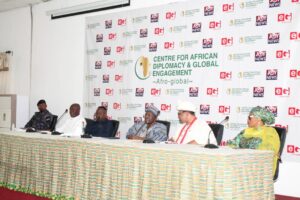The Speaker of Parliament, Alban Sumana Kingsford Bagbin, has stressed the need for a concerted effort and inclusiveness to tackle the emerging global challenges affecting the development and economy of many countries.
He said this is crucial as it will result in coming up with a meaningful and collective response to the crises.
“The emerging global challenges have proven to require the concerted effort of humanity in general to ensure there are thorough resolutions. Inclusivity is therefore the new catchword identified to hold the promise of growth and sustainability in the world today.
“Individualism and selfishness appear to influence the behaviour of both individuals and states. Inclusiveness is increasingly becoming a mere slogan. At a time when our world is driven by geopolitical devices, conflict and instability, there is also an increase in lingering differences between the world’s great powers – limiting our ability for a meaningful collective response,” he said.
The Speaker added that the lack of a global approach for dealing with crises such as the Russia-Ukraine war shows that the world has not learned any lessons about the need to practice inclusiveness.
“The consequent hardship around the world because of the intransigence of global political leadership does not appear to send any reminders about need for the world to act together in due regard in the interest of everyone and to the detriment of no-one – and this is a strong message to those who claim to be global powers,” he said.
Mr. Bagbin made these remarks in his keynote address at the Centre for African Diplomacy and Global Engagement (Afro-Global) launch in Accra, on the theme ‘Mobilising global citizenship in building a resilient and inclusive post-COVID-19 global economy.’

Afro-Global launched
The Africa Diplomacy and Global Engagement think-tank has been launched to serve as a hub in providing cutting-edge scholarly research and training, as well as to promote public engagement on global policy issues using multidisciplinary perspectives and approaches to contribute toward implementing effective policies for various aspects of Africa’s global and diplomatic relations.
In so doing, the Centre aims at building networks across Africa, focusing on key countries such as Ghana, Nigeria, South Africa, Kenya and Egypt, and organisations such as the African Union (AU), Economic Community of West African States (ECOWAS) and United Nations (UN).
The Centre is committed to promoting diplomacy as the best approach to solving global problems, and promoting global citizenship.
It will do this by mobilising support through public intellectualism, activism and research in promoting global citizenship and global activism in support of initiatives such as the Sustainable Development Goals, and promoting the values of humanity by highlighting areas of discrimination and abuse to help devise global solutions.
Director and Lead Research for the Centre, Prof. Lord Mawuko-Yevugah, noted among other things that it will be a resource Centre for researchers and policymakers across the African continent to engage critically in policy debates and decisions.
The Centre will also provide avenues for internship and practical training for both current students and recent graduates as its contribution to the training and development of critical human resources for various Ministries, Agencies and Departments (MDAs) across Africa.










